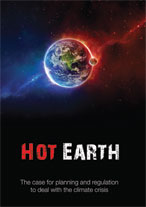Anger builds at CSIRO debacle
It takes a lot to get the public spotlight to turn onto the country’s unassuming, long-established research and development organisation. The value of the quietly achieving Commonwealth Scientific and Industrial Research Organisation is widely recognised and questions are now being asked about where we would be as a community without the CSIRO and its research for the public good. Staff, including senior staff, and the public are worried. Since current Chief Executive and former Silicon Valley entrepreneur Larry Marshall took over in January 2015, the axe has been taken to staffing and budgets, and almost the entire emphasis of research directed at market-ready, profit-turning products.

The contrast between the Turnbull government’s “innovative” economy rhetoric and the blood-letting at the CSIRO couldn’t be more stark. Sam Popovski, secretary of the CSIRO Staff Association, set down the extent of the cuts in a recent letter to Christopher Pyne, the Minister for Industry, Innovation and Science.
“On the 4th of February 2016, CSIRO CEO Larry Marshall announced 350 job cuts. Based on subsequent information provided by CSIRO, the total jobs now earmarked to go is actually 450: 100 in Land and Water, 100 in Oceans and Atmosphere, 70 in Data61, 40 in Agriculture, 40 in Manufacturing, 40 in Mineral Resources, 20 in Food and Nutrition and 40 in Research Support.” He went on to point out that the latest cuts are on top of the 1,300 jobs already lost over the past two years.
The letter made the unprecedented request of Pyne to direct the CSIRO to suspend its proposed changes until after the federal election and to establish a fully independent inquiry into CSIRO’s corporate management function, structure and processes.
CSIRO staff have been in dispute with the agency since the February 5. The mood of staff is reported to be morphing from demoralisation to anger and resistance. Public rallies in Melbourne, Hobart and Canberra attracted thousands. Resources to give support are available on the staff association’s website: cpsu-csiro.org.au/campaigns/support-csiro and a friends of the CSIRO (along the lines of Friends of the ABC) to defend the public’s precious asset. Contact Kathryn Kelly at kathrynk09@gmail.com if you can help.
Why all the fuss?
The public has been stunned by revelations before a Senate Committee called by the Greens and Labor. The fate of research and development is being determined by the new breed of CSIRO senior managers in private emails. In one of them, science and deputy director Andreas Schiller urged other managers to engage in some “deep-diving” discussions about funding. He said the CSIRO should stop doing “science for science’s sake” and that the “public good is not good enough, needs to be linked to jobs and growth ... .”
One wonders how many of the CSIRO’s many achievements would have been possible with such a narrow focus. What market driven mechanism would have delivered a vaccine for the Hendra virus to prevent its transmission from bats to humans; a uniquely Australian problem? And where would we get the sustainable water limits for water use in the Murray-Darling river system? Is it conceivable that this motivation would have seen CSIRO scientists tow a caravan full of measuring equipment to Cape Grim in Tasmania’s north-west where they quickly detected the impact of ozone-depleting chemicals on the atmosphere? No is the short answer.
The inquiry heard lots of bad news about climate science in particular. Alex Wonhas, who oversees environment, energy and resources at the CSIRO, said “I don’t think that I can credibly claim that everything [we are doing now] will continue”. He lamented so-called “blue-sky research” without current application will be reduced, “which in the long-run might be to the detriment [of CSIRO’s capability].”
Marshall accepts that the science of climate change is settled but insists that the role of the organisation is now only to devise means to combat the challenge. This seemingly “hands on” approach was questioned in the Senate Committee.
Labor senator Kim Carr put a question to Professor Tony Haymet, Distinguished Professor of Oceanography. “What is your view as to the claims made about the changing nature of the CSIRO’s work and the need to move from modelling of climate change through to adaptation measures? How do you respond to that assertion?”
“It is just wrong. I could use more impolite words, but it is at a schoolboy level of logic. As I said before, you cannot mitigate something when you do not know what it is you are trying to mitigate against,” the professor replied.
More questions than answers
It was also revealed that the CSIRO is considering out-sourcing climate modelling work to the British Met Office. Hardly a cost-cutting move. In fact, while the agency is fast changing itself into a “glorified consultancy”, as Senator Carr observed, the justifications for changes and cuts don’t to stack up.
Marshall told the select committee that the agency doesn’t have a target for revenue from external sources. At the moment only $70 million of the $500 million raised comes from the private sector. The rest comes from federal agencies that are all suffering their own budget woes.
How exactly is the Entrepreneurs in Residence project being run? The positions aren’t advertised so what is the method for engagement? Are ex-corporate personnel returning to the CSIRO at greater cost? And what will happen to the intellectual property developed in this new commercial environment? Current staff sign an undertaking that such property belongs to the CSIRO and the people of Australia. How can the public be sure the entrepreneurs are truly “missionaries” and not “mercenaries”, as the CEO claims?
Do or die
The CSIRO has faced government attacks before. The Coalition and Labor have both hacked into its funding and meddled over the years.
Several decades ago, founding CSIRO chairman David Rivett made the following complaint to a colleague:
“Like you I am unhappy about the future, The main danger as I see it is that people will knuckle under to the bureaucratic regime and, by avoiding fight and seeking comfort, they will gradually reach a condition of tolerant acquiescence in what they formerly knew to be wrong. A generation will arise that knows not freedom and will be content to do without it. Then some day an old battle will be fought over again.”
But the latest changes threaten to complete the destruction of an internationally respected and indispensable public enterprise. Its declining reputation has been noted by the New York Times and others internationally. Capitalist “logic” is distorting its role, in readiness for the diktats of the Trans-Pacific Partnership and the Trade in Services Agreement.
Thankfully, CSIRO staff and the public have shown themselves willing to fight.













